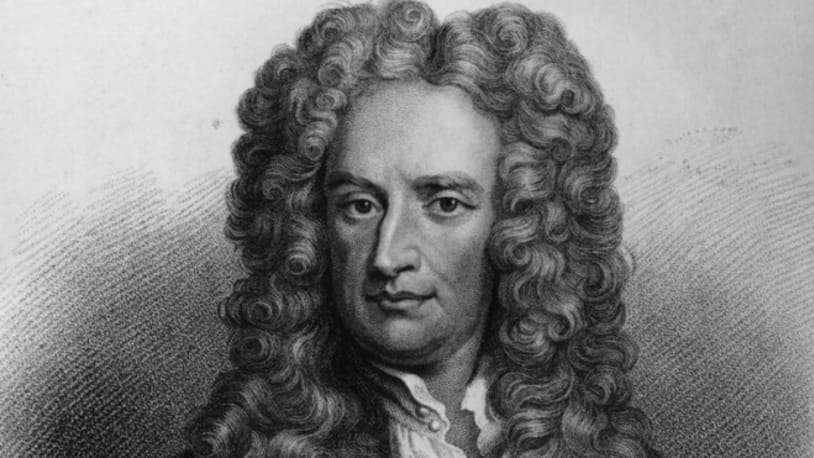Isaac Newton is widely regarded as one of the most influential scientists in history. His contributions to mathematics, physics, and astronomy transformed our understanding of the natural world and laid the groundwork for modern science. Born in England in 1642, Newton developed an early interest in mechanical devices and mathematics that would eventually lead him to make groundbreaking discoveries about motion, gravity, light, and optics.
Today, Isaac Newton’s legacy continues to inspire scientific inquiry and innovation. This article explores his life, work, and impact on philosophy through an overview of his major ideas and achievements as well as a discussion of his lasting influence on our understanding of nature and the universe.
Overview of Isaac Newton’s life and work
Isaac Newton was a renowned English physicist and mathematician, born on January 4, 1643. He is widely considered one of the most influential scientists in history, making significant contributions to the fields of physics, mathematics, astronomy, and optics. Newton’s work laid the foundation for modern physics and his laws of motion are still used today to explain the behavior of objects.
Newton’s early life was marked by family tragedies – his father died three months before he was born and his mother remarried when he was three years old. Despite this difficult start, he excelled academically and attended Trinity College at Cambridge University where he studied mathematics. In addition to his famous laws of motion, Newton also developed calculus independently from Gottfried Leibniz and made groundbreaking discoveries in optics through experiments with prisms.
In later life, Newton became interested in alchemy and theology. He held various positions throughout his career including as a professor at Cambridge University and as president of the Royal Society. Ultimately, Isaac Newton’s legacy has had an enduring impact on science and remains an inspiration for generations of scientists who followed in his footsteps.
Early Life: Newton’s Childhood and Education
Isaac Newton was born on January 4, 1643, in Woolsthorpe, Lincolnshire, England. His father died three months before his birth, and his mother remarried when he was three years old. He grew up with his grandparents until he was twelve years old when his mother returned with her new husband to take him out of school to work on their farm. However, Isaac showed little interest in farming or any manual labor.
After two years on the farm, Isaac’s uncle convinced his mother that he should return to school. At the age of sixteen, he entered Trinity College at Cambridge University as a subsizar (a student who worked as a servant). He quickly distinguished himself in mathematics and natural philosophy (what we now call science) but struggled with Latin and Greek.
Despite these setbacks, Newton earned a scholarship that allowed him to continue studying at Cambridge for four more years. In 1665-1666 while still, an undergraduate student at Trinity College Cambridge University Newton developed early theories about light which prompted him to construct a reflecting telescope rather than using the refracting telescope of Galileo which is normally used by astronomers at that time.
Scientific Contributions: Laws of motion, gravity, optics
Isaac Newton made significant contributions to the field of physics, particularly in the areas of motion, gravity, and optics. He is primarily known for his three laws of motion which describe how objects move and interact with each other. These laws have been instrumental in understanding and predicting the behavior of physical systems.
Newton also developed the law of universal gravitation, which explains how all objects in the universe attract each other with a force proportional to their masses. This law has been crucial in understanding celestial mechanics and predicting the motions of planets and other celestial bodies.
Finally, Newton’s work on optics led to a better understanding of light and its properties. He demonstrated that white light is composed of different colors and developed a theory explaining why light behaves as both a wave and a particle. His contributions to these fields have had far-reaching implications for modern science and technology.
Philosophical Ideas: Natural philosophy, theology, alchemy
Natural philosophy, theology, and alchemy are three philosophical ideas that were intertwined during the time of Isaac Newton. Known as the father of modern physics, Newton made groundbreaking contributions to these fields. His natural philosophy, which dealt with studying nature using observation and experimentation, laid the foundation for modern science.
Newton’s theological beliefs were also an essential part of his life and work. He believed in God as the creator of the universe and saw his scientific discoveries as a way to understand God’s creation better. His theological views influenced his scientific theories, such as his belief in gravity being a force that holds the planets in orbit.
Alchemy was another area that fascinated Newton. He spent much time studying alchemical texts and conducting experiments on transmutation. Although he did not have much success in this field, it is said that some of his discoveries in chemistry were due to his alchemical research.
Overall, these three philosophical ideas had a significant impact on Isaac Newton’s life and work. They shaped how he viewed the world around him and contributed to some of history’s most significant scientific breakthroughs.
Legacy: Impact on Science and Philosophy
Isaac Newton’s legacy has had a profound impact on both science and philosophy. In the scientific realm, Newton’s laws of motion and theory of gravity provided a foundation for modern physics. His mathematical principles continue to be used in fields such as engineering, astronomy, and even economics.
Newton’s contributions to philosophy are equally significant. His belief in an ordered universe led him to seek out natural laws and universal truths, which influenced the development of the Enlightenment movement. Additionally, his work on optics helped shape the understanding of perception and reality.
However, Newton’s legacy is not without controversy. Some philosophers argue that his emphasis on empirical evidence over metaphysical speculation limits our ability to fully understand the nature of reality. Despite these criticisms, it is undeniable that Isaac Newton remains one of the most influential figures in both science and philosophy.
Criticisms: Controversies surrounding Newton’s work
One major criticism of Newton’s work is the controversy surrounding his theory of gravity. Some scientists and philosophers argue that the concept of action-at-a-distance, which forms the basis of Newton’s theory, violates principles of causality and is incompatible with other theories such as relativity. Others point out inconsistencies between Newton’s laws and observations made at extremely small or large scales.
Another issue that has been raised is Newton’s treatment of light and color. While he was able to make groundbreaking discoveries in this field, such as demonstrating that white light could be separated into its component colors with a prism, his explanation for how this occurred was flawed. His idea that different colors were associated with different-sized particles within light was later disproven by experiments conducted by Thomas Young and others.
In addition, some have criticized Newton for his focus on mathematical precision over physical intuition in his work. This approach may have limited his ability to fully understand or explain certain phenomena, particularly those outside the realm of classical mechanics. Despite these criticisms, however, it cannot be denied that Isaac Newton remains one of the most influential scientists in history who revolutionized our understanding of the natural world.
Conclusion: Summary of Newton’s Significance in the history
In conclusion, Isaac Newton’s contributions to the field of physics and mathematics have greatly impacted the history of science. His three laws of motion and the law of universal gravitation provided a comprehensive explanation for the movements in our universe. Additionally, his development of calculus has made mathematical calculations much more efficient and accurate.
Newton’s impact extends beyond just scientific discoveries; he also played a role in shaping modern society through his involvement in politics and economics. As Master of the Mint, he reformed England’s coinage system, which led to economic stability and growth.
Overall, Newton’s legacy continues to influence scientific exploration today. His work laid the foundation for future discoveries in physics and mathematics, making him one of the most significant scientists in history.














